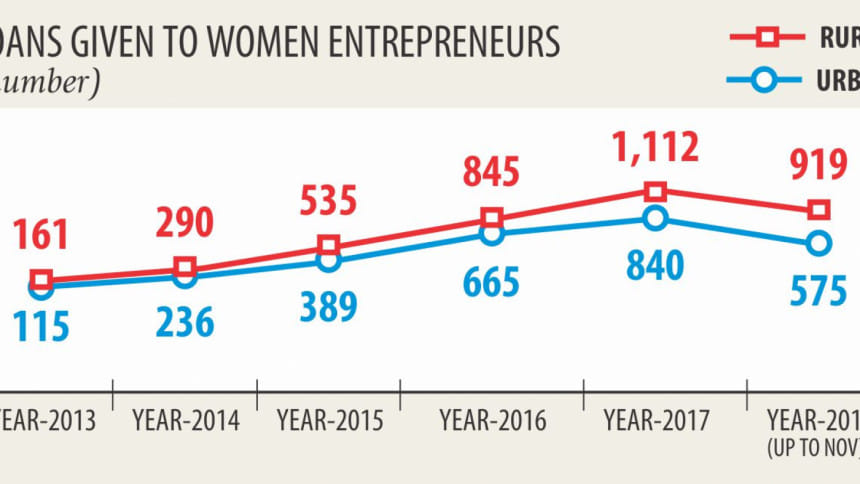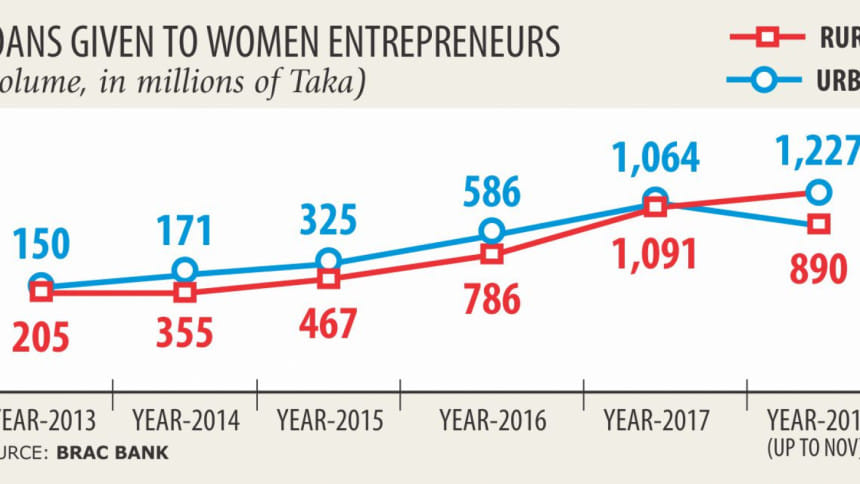Social challenges hold back women's economic participation

Social challenges have held back women's economic participation over the last decade, despite headway made in education, training, entrepreneurship, and jobs overseas.
While delivering the budget speech in parliament for fiscal year 2018-19, Finance Minister AMA Muhith acknowledged that women's economic participation was low compared to the growing literacy rate.
The number of women – aged 15 and above – who could read and write increased to 65.3 percent in 2016-17 fiscal from 54.3 percent in 2009.
The female labour force participation rate has hovered around 36 percent since 2010, according to Bangladesh Bureau of Statistics surveys.
This means strategies adopted by the government in the last decade to facilitate women's employment did not make any significant change.
Success of government programmes like easy loans for aspiring women entrepreneurs, employment opportunity in Saudi Arabia, and training on ICT is visible but is not enough to offset the social challenges a woman has to deal with.
Not much attention had been given to social issues that pose challenges for women trying to enter the labour market, according to Sayema Haque Bidisha, an economics professor at Dhaka University.
In a patriarchal setting, the responsibility of caring for children and the elderly mostly falls on female members of a family. Social services like child care or elderly care are yet to get an institutional shape in Bangladesh. Two other factors are safe commute to work and positive work environment, Bidisha said.
Had these issues been addressed, women would have been able to make significant contribution to the economy.
Muhith, during the budget speech for fiscal year 2016-17, projected that a 10 percent increase in female labour force participation over the next five years would bring one additional percentage point of GDP growth each year.
THE PROGRAMMES
Easy, collateral-free loans from Bangladesh Bank's refinancing scheme seem to have enabled a significant number of rural and urban women entrepreneurs.
According to data from Brac Bank, the number of women borrowers increased seven times since 2013. As many as 1,952 entrepreneurs took out loans of Tk 215.6 crore last year to expand their small and medium businesses.
The recovery rate of such loans is 98 percent, which means most women entrepreneurs are successfully running their businesses, said Syed Abdul Momen, head of SME banking, at the Brac Bank headquarter.
About the challenges women entrepreneurs face, he said paperwork becomes difficult for them since they are new to business.
“They often end up bribing government officials to get trade licences and tax identifications number,” he said.

Appreciating the government initiatives to encourage female entrepreneurs, Nazneen Ahmed, a researcher at Bangladesh Institute of Development Studies, said newcomers still face difficulties in transforming their ideas into reality.
They lack the know-how of making business plans and proposals, she added.
Besides, to get loans, they have to pass an evaluation by banks where they need to show records of an operational business for at least one year.
“But many of them need money to start a business. So, they cannot use these opportunities,” Nazneen added.
The government can allocate a separate fund for new entrepreneurs -- to spend on training, logistical support, legal counselling and on disbursing loans -- without any guarantee of repayment, said Priti Chakraborty, director of Federation of Bangladesh Chambers of Commerce and Industry.
“More women would then start businesses. Even if they face initial hiccups, they would help generate employment,” she added.
For overseas employment, the government signed an agreement with Saudi Arabia in 2015 to send women to work as housemaids. Until October this year, over 2.3 lakh women have gone to Saudi Arabia for work.
However, 7,000 of them returned after being tortured, injured, raped and at least five impregnated, said Brac's Head of Migration Programme, Shariful Islam.
Women jobseekers must go through screening and training so that they can go for skilled employment where they would get higher pay, respect and legal protection.
“The percentage of returnees may seem negligible but there is no survey on the wellbeing of female migrant workers there. Lack of remedy for those who return traumatised, with broken limbs, or impregnated is troubling,” Shariful added.
Women have had opportunities to receive training but experts say those were not enough.
“She Power Project”, launched by the government's ICT division in 2017, will continue until June next year to train 10,500 women on ICT. On completion, they will be given Tk 20,000 each to buy a laptop and be placed at local organisations to gather practical experience, before they start their own businesses.
The ICT division ran another project to train 14,460 women between March 2014 and June 2015 on ICT and freelancing.
All these efforts have not been successful in bringing more women out of their social and familial boundaries as economic indicators suggest.
Safety and other issues that limit women can be addressed by engaging and encouraging the private sector and by offering incentives like tax redemption for having a day-care on company premises, experts say.
A good example of income generation might be Joyeeta Foundation. Once its under-construction building is ready, it will cater to women entrepreneurs with facilities for a day-care and a place to display their products.
Founded in 2011 under the women and children affairs ministry, Joyeeta – currently located on two rented floors at Rapa Plaza in Dhanmondi, Dhaka – is working with 180 rural women's groups across the country. The entire operation is run by women.
As many as 17,000 women showcase their products, like garments, handicrafts and food through Joyeeta. The organisation bears 20 percent of the rent with the rest taken care of by the government, said Kamal Hossain, deputy director of Joyeeta Foundation.

 For all latest news, follow The Daily Star's Google News channel.
For all latest news, follow The Daily Star's Google News channel. 



Comments